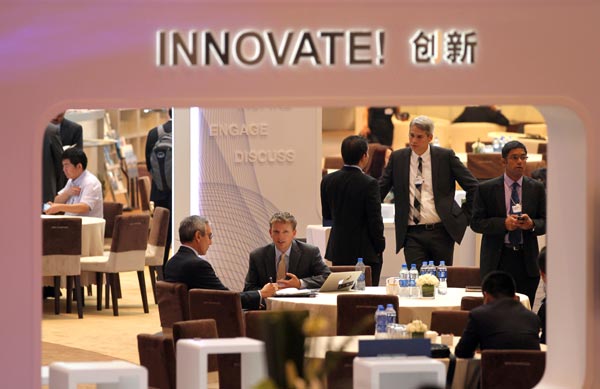By Zheng Yangpeng in Dalian, Liaoning ( China Daily)
Banker says blocking Sany, Huawei Technologies 'totally groundless'
A decision in the United States to block Sany Group Ltd's involvement in a wind farm projectwas "foolish" and blurred the whole picture of a general open US attitude toward Chineseinvestment, a top Chinese banker said at the Summer Davos.
Li Ruogu, chairman of the Export-Import Bank of China, a State policy bank, said the US movewas "totally foolish" and its justification of the move citing "national security" was totally"groundless".
Sany is a major Chinese private-sector maker of heavy equipment.
|

Participants chat during a break at the Summer Davos in Dalian, Liaoning province, on Thursday.Francisco J. Sanchez, US undersecretary of commerce for international trade, said the US is open toChinese investment. China's direct investment in the US grew 123.5 percent to $4 billion in 2012. ZouHong / China Daily
|
"The case, as well as the Huawei case, is so typical. I don't know why the US government madesuch a foolish decision. Isolated cases have made an issue that should not be a 'problem' intoa 'problem'," he said.
Ralls Corp, which is incorporated in Delaware and operates out of Peachtree City, Georgia, isprivately owned by two Chinese nationals - Duan Dawei, chief financial officer of Sany Group,and Wu Jialiang, a Sany vice-president and general manager of subsidiary Sany Electric Co.
Ralls had sought to build or acquire US wind farms where Sany's turbines could be used. Oneof those farms was in Oregon, near restricted airspace above a US military base. US PresidentBarack Obama decided to block the project.
Another private company Huawei Technologies Ltd, was barred from access to the US market,also over national security concerns.
The two cases, both of which took place in late 2012, generated widespread media coverageand heated debate in China, exacerbating the perception that the US market is persistentlyclosed to Chinese investment.
But Francisco J. Sanchez, US undersecretary of commerce for international trade, a panelist inthe Davos discussion in Dalian, dismissed the claim that the US is not open to Chineseinvestment.
He said that 98 percent of foreign countries' outbound direct investment into the US requires nogovernment review, and the vast majority of investments that are reviewed are ultimatelyapproved.
"This (review) is not unique to China. It applies to (companies) all over the world who hope toinvest in or acquire technologies that we deem as related to national security," said Sanchez.
"I want to make it very clear that the United States welcomes Chinese investment," he said.
The two cases did obscure the overall robust picture of Chinese investment in the US. In 2012,the Chinese mainland's ODI in the US grew 123.5 percent to hit $4 billion. At that point, the USbecame the second-largest ODI destination after Hong Kong, according to a Chinesegovernment report.
By the end of 2012, cumulative investment from the Chinese mainland in the US was $17billion.
Ma Weihua, chairman of Wing Lung Bank and former chairman of China Merchants Bank, saidmost Chinese companies are not prepared to "go global", as shown in the high percentage offailures in ODI.
In 2010, more than 10 percent of Chinese outbound investments failed, one of the highestrates in the world. More than 20 percent had lost money, he said.
"Many Chinese companies do not have a clear strategy in terms of going abroad. Some just goabroad because they think they are big enough. And the low-price strategy they generallyapply abroad could easily provoke local repulsion," Ma said.
Li, the banker, pointed out that Chinese executives abroad have very limited integration withlocal cultures: They tend to work and live in an isolated environment in foreign markets andseldom communicate with locals. They are particularly weak at language skills.
"Throughout my intensive travel experience in Africa, my personal feeling is that Chineseculture hardly resonates with these developing nations," he added.
Michael Andrew, global chairman of KPMG International, a global auditing corporation, said thefirm's survey of Chinese clients showed that a few years ago, 86 percent of Chinese companiesthat had outbound investment were State-owned enterprises. Their investment wasoverwhelmingly concentrated in energy and infrastructure. But now more investors aretargeting areas such as food, technology and services.
